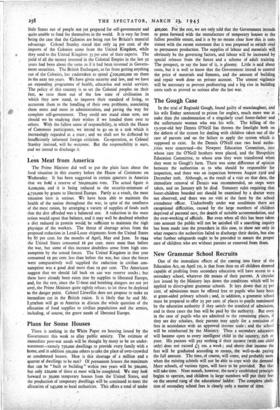Less Meat from America
The Prime Minister did well to put the plain facts about the food situation in this country before the House of Commons on Wednesday. It has been suggested in certain quarters in America that we hold a reserve of 700,000,000 tons. The actual figure is 6,000,000, and it is being reduced to the security-minmum of 4,750,000 by grants to liberated Europe. Partly as a result, the meat situation here is serious. We have been able to maintain the health of the nation throughout the war, in spite of the smallness of the meat ration, by arranging a variety of supplies of foods such that the diet afforded was a balanced one. A reduction in the meat ration would upset that balance, and it may well be doubted whether a diet reduced in protein would, be sufficient to maintain the high physique of the workers. The threat of shortage arises from the proposed reduction in Lend-Lease shipments from the United States by 87 per cent. for the months of April, May and June. In 1944 the United States consumed 16 per cent. more meat than before the war, but some of this increase doubtless arose from high con- sumption by the armed forces. The United Kingdom in that year consumed 19 per cent. less than before the war, but since the forces were comparatively well supplied the reduction in civilian con- sumption was a good deal more than 19 per cent. The Americans suggest that we should fall back on our war reserve stocks ; but these have already been eaten into by supplies to liberated Europe, and, for the rest, since the U-boat and bombing dangers are not yet over, the Prime Minister quite rightly refuses to let these be depleted to the danger point. Colonel Llewellin does not propose to make an immediate cut in the British ration. It is likely that he and Mr. Lyttelton will go to America to discuss the whole question of the allocation of food supplies to civilian populations and the armies, including, of course, the grave needs of liberated Europe.


























 Previous page
Previous page